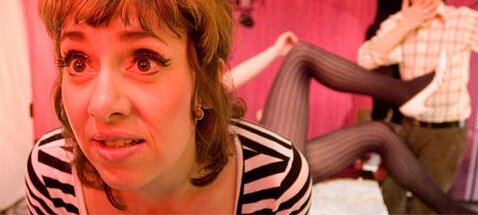
“This is real.” The phrase, as repeated by members of The Gob Squad at their On The Boards run of Kitchen (You’ve Never Had It So Good) ($25 through Sunday), takes on religious significance.
The audience first encounters the phrase on entering the theatre as we are guided through a sound stage, passing three sets and a control board. The cast welcomes us to the sets and assures us that everything we see is real from the painting of a fridge to the mug hanging from the painting of a kitchen cabinet.
It is entirely possible to know nothing about Andy Warhol and still have a great time at Kitchen, but is it possible to know nothing about Andy Warhol? Half a century after the first soup can painting even those who’ve never heard Warhol’s name recognize his work.
As a character in this production says, “I’m not a cliché; it’s the Sixties, I’m the original!” Of course in Warhol-land, with his invented stardom, silkscreened repetitions, and recreation of mass-produced consumer culture, the notion of original is as slippery as that of the real. However real or original this production may be, Gob Squad guarantees it will be hilarious and thought-provoking.
Repetition and recreation make up most of this performance in the form of reenactments of the highlights of Warhol’s rarely seen films, which is all to the good. Far from the diffuse art-slog of Sleep or Eat, this performance is consistently engaging. A lull around the second quarter mark only serves to sling the action forward as the performance shifts gears into the highly effective second half.
The realness of the performance is under constant questioning. For the most part the actors do not play the actors in the original films, but themselves attempting to reenact what was performed for the camera at The Factory (Warhol’s studio) in the sixties. To that end the characters include Berit (Berti Stumpf) as an uptight intellectual, Sarah (Sarah Thom) as a louche, unmoored earth mother, and Simon (Simon Will) as the gay cliché. Sharon (Sharon Smith) is the clown among fools as a hilarious glamour-light take on the Nico/Edie Sedgwick-type, with heavier emphasis on the Sedgwick side.
What we see from the audience is a set of three projections, one for each set—a technique evoking Chelsea Girls. Most of the action takes place in the central kitchen set while films such as Sleep, Kiss, and the screen tests are reenacted on the left and right. The women, particularly Berit and Sarah, make repeated attempts at inserting feminism into all the stylish pabulum, evoking echoes of Valerie Solanos’s attempt to assassinate Warhol. Through all this the Gob Squad members analyze and eulogize the original films, the sixties, and their relationship to them with particular emphasis on the actors’ real bourgeois lives.
The question of the real remains bounded by the sound stage for most of the first half. There Gob Squad threatens to take us into maudlin nostalgia with much talk of how much more exciting life was in the Sixties. The actors even attempt to smoke cigarettes in the name of all things 1960s and the smell of those herbal cigarettes is the first sign that this show might break out from behind its shadow-puppet screen.
The going theory suggests that film is a kind of shadow-puppetry in which the editor is the puppeteer and the reel of film (or digital file) itself, or its projection, is the puppet. The puppetry of this Gob Squad production is a bit different in that it is one in which the actors and tech staff consciously create images on a screen directly, in real time, and without significant editing. The actors perform and we respond. That puppet/puppeteer relationship is extended further in the show’s latter half (spoiler alert) as participants, drawn from the audience, act out instructions and text provided by the cast through headphones.
The thrill of watching these unprepared non-performers performing scenes from Kitchen to Blow Job cuts to the heart of Warhol’s work. It even justifies the nostalgia and hagiography of the sixties.